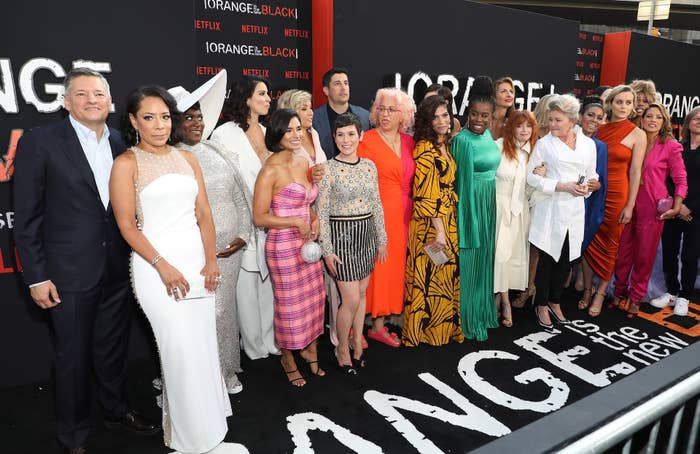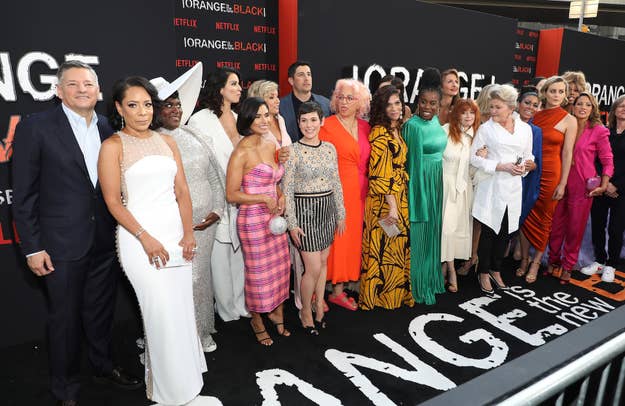
Orange Is the New Black was one of Netflix’s first hit shows, and some of its stars are speaking out about how they weren't adequately compensated and now receive pitiful residuals.
As the show celebrates its 10-year anniversary on Thursday, 10 recurring cast members spoke with The New Yorker about how much they were paid for their roles. They described getting the “absolute bare minimum” Screen Actors Guild day rate, which was less than $1,000 per episode when Orange got started in 2013.
The group of actors includes Kimiko Glenn, Taryn Manning, Alysia Reiner, Beth Dover, Emma Myles, Diane Guerrero, and Lea DeLaria, a number of whom started in the supporting cast and moved to regulars.
Among the other items discussed in the piece are the wage gap between minority and non-minority cast members, and the fact that some had to keep their 9-to-5 jobs while they shot Orange Is the New Black. Dover said, “It actually cost me money to be in Season 3 and 4 since I was cast local hire and had to fly myself out.”
Many in the cast also haven’t received much in terms of residuals from streaming.
“The first thing we say to each other when we see each other, is, like, 'Yeah, it’s really fucked up—all my residuals are gone!'” Myles said. “When you’re a kid, you have this idea: once I’m on something that people actually see, I’ll be rich, and I’ll have a house that has a bathtub. And you look around after being on a hit show, and you’re, like, Wow, I’m still in the same one-bedroom apartment. Was this how it was supposed to be?”
Based on Piper Kerman’s memoir of the same name, Orange Is the New Black was Netflix's third original series ever, debuting in the then-unique binge format five months after House of Cards. It became the streamer's most-watched original show for a period and won four Emmys over seven seasons, wrapping in 2019.
Over the course of time, series regulars were paid up to $200,000 for each episode, and supporting cast members made a maximum of $15,000.
“As the seasons progressed, we started to get more disgruntled about money, mostly because of how incredibly popular the show was. And then it felt, like, Well, my friends on network shows are incredibly wealthy,” an actor who didn’t disclose their identity told The New Yorker.
Netflix infamously does not share its viewership numbers, including with many of the creative forces behind its shows and movies. The piece includes a description from executive producer/writer Tara Herrmann of the moment when creator Jenji Kohan was finally informed "a hundred million users had seen at least one episode, and I want to say at least half had completed all six seasons."
Alysia Reiner, who played Warden Natalie Figueroa, gave a quote the piece's author, Michael Schulman, said "sums it up."
“We all took a risk together. And the reward for Netflix does not seem in line with the reward for all of us who took that risk. I can go anywhere in the world and I’m recognized, and I’m so deeply grateful for that recognition," Reiner said. "Many people say they’ve watched the series multiple times, and they quote me my lines. But was I paid in a commensurate way? I don’t think so.”
Lea Delaria, meanwhile, said her residuals amount to $20. “I remember all of us thinking, ‘Give us the money!’ ... We were keenly aware that we weren’t being paid,” the comedian recalled.
The New Yorker’s interview was published just before SAG-AFTRA revealed that it was going on strike, as the union and the Alliance of Motion Picture and Television Producers group of studios and streamers came nowhere near settling on a fair deal. The WGA's writers' strike has been going for 73 days. The article is now being used to illustrate a number of reasons why the unions' strikes are necessary, including the unfortunate end results of Netflix not giving up numbers to quantify how successful its mega-hits really are.

